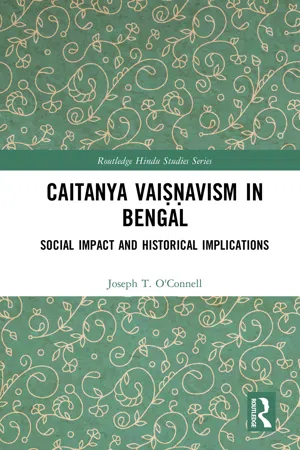
Caitanya Vaiṣṇavism in Bengal
Social Impact and Historical Implications
- 294 pages
- English
- ePUB (mobile friendly)
- Available on iOS & Android
Caitanya Vaiṣṇavism in Bengal
Social Impact and Historical Implications
About This Book
Within the broad Hindu religious tradition, there have been for millennia many subtraditions generically called Vai??ava, who insist that the most appropriate mode of religious faith and experience is bhakti, or devotion, to the supreme personal deity, Vi??u. Caitanya Vai??avas are a community of Vai??ava devotees who coalesced around K???a Caitanya (1486–1533), who taught devotion to the name and form of K???a, especially in conjunction with his divine consort R?dh? and who also came to be looked upon by many as K???a himself who had graciously chosen to be born in Bengal to exemplify the ideal mode of loving devotion ( prema-bhakti ).
This book focusses on the relationship between the 'transcendent' intentionality of religious faith of human beings and their 'mundane' socio-cultural ways of living, through a detailed study of the social implications of the Caitanya Vai??ava devotional Hindu tradition in pre-colonial and colonial Bengal. Structured in two parts, the first analyzes the articulation of K???a- bhakti within the broad Hindu sector of Bengali society. The second section examines Hindu–Muslim relationships in Bengal from the particular vantage point of the Caitanya Vai??ava tradition, and in which the subtle influence of K???a- bhakti, it is argued, may be detected. In both sections, the bulk of attention is given to the sixteenth and seventeenth centuries, when Bengal was under independent Sultanate or emergent Mughal rule and thus free of the impact of British and European colonial influence.
Arguing that the Caitanya Vai??ava devotion contributed to the softening of the potentially alienating socio-cultural divisions of class, caste, sect and religio-political community in Bengal, this book will be of interest to academics in the field of Asian Religion and Hinduism, in particular devotional Hinduism, both premodern and modern, as well as to scholars and students of South Asian social history, Hindu-Muslim relations, and Bengali religious culture.
Frequently asked questions
Information
Table of contents
- Cover
- Half Title
- Series Page
- Title Page
- Copyright Page
- Table of Contents
- List of tables
- Editor’s note
- Introduction
- Part I Kṛṣṇa-bhakti
- Part II Hindu–Muslim relations in Bengal
- Bibliography
- Index